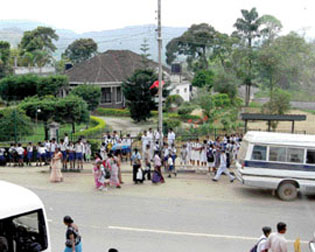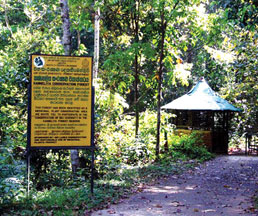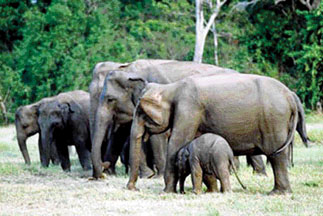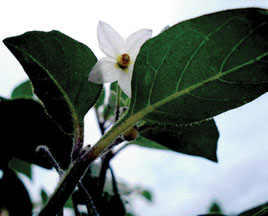|

Expanding school bus service
 |
|
Students waiting for school
buses. |
The school bus service, Sisu Saviya is to be expanded throughout the
island by the Transport Ministry in collaboration with private bus
operators.
Covering 55 per cent of the island through the school bus service by
December 2008 is the main aim of the National Transport Commission (NTC).
Funds to implement the project e.g. to purchase buses, would be released
by the Treasury.
It order to provide an efficient and safe transport service to
schoolchildren, the Cabinet had approved the purchase of 300 buses for
this school bus service.
The NTC expects to use about 1,000 private and SLTB buses for the
Sisu Saviya by next January. Private bus operators who register with the
NTC for this programme would get a subsidy from the Commission to cover
their losses as they can charge only 10 per cent of the normal bus fare
on these buses.
Private school buses will be painted in a different colour for easy
identification.
Such colouring material would be provided by the Commission free of
charge.
Programme to conserve rain forests
 |
|
Kanneliya forest reserve |
A programme to conserve low country rain forests is to be implemented
by the Forest Conservation Department shortly. As part of this programme,
a survey of the Kanneliya forest reserve in the Galle district has
already begun.
This forest, which is 5,309 hectares in extent, is next to the
Dediyagala and Nakiyadeniya forests. According to the Forest
Conservation Department, this rain forest contains over 234 rare species
of flora.
Electrified fence to keep away wild elephants
 |
|
Elephants at Minneriya |
An electrified fence between the Minneriya National Park and its
neighbouring villages is to be erected by the Wildlife Conservation
Department.
This nine-kilometre electrified fence to come up between the park and
the villages Moragasveva, Udaakala Gama and Threesinhagama, will keep
away wild elephants. The Department has earmarked Rs. 4.8 million for
this project which is being implemented by a local community
organisation called the Vana Sarana Prajaamuula Sanvidhaanaya of
Moragasveva. Funds worth Rs. 303,360 have already gone towards the
project.
Cultural Centre at Nawimana
Last week, we told you about the cultural centre which is proposed to
be set up in Veyangoda. The Ministry of Cultural Affairs has more plans
to boost the cultural sector of Sri Lanka. It has also made arrangements
to establish another Cultural Centre at Nawimana, Matara.
It is expected to cost around Rs. 400 million. Funds worth Rs. 100
million has already been allocated for the preliminary work with regard
to the new cultural centre. This centre is expected to co-ordinate the
activities of all the regional cultural centres in the Southern
Province.
Indian berries fight dengue mosquitoes
Berries of a common weed found in India may be effective in fighting
mosquitoes that spread dengue fever, a study has found.
Synthetic insecticides are increasingly useless in fighting
disease-spreading mosquitoes, such as the Stegomyia aegypti that can
spread dengue and yellow fever viruses.
In the online open-access journal BMC Complementary and Alternative
Medicine, scientists in India described how they used juice and extracts
from the Solanum villosum weed and found it was particularly effective
in eliminating S. aegyptil arvae.
 |
|
Solanum villosum |
“The extract from the plant could be used in stagnant water bodies
which are known to be the breeding grounds for mosquitoes,” Nandita
Chowdhury, Anupam Ghosh and Goutam Chandra from Burdwan University in
India’s West Bengal wrote.
They went on to discover the juices contained certain chemical
compounds.
“These act as a repellent which protects against the lethal effects
of the larval mosquitoes,” they added. From Africa to Asia to Latin
America, around 2.5 billion people live in areas where they are at risk
of dengue fever.
There is no vaccine or drug to treat the illness, which killed an
estimated 22,000 people last year, most of them children.
Due to international travel and climate change, the aegypti
mosquito’s habitat is spreading.
In January, health officials warned that the disease was poised to
move across the United States.
It has been spreading aggressively in Latin America and the
Caribbean, reaching epidemic levels last year.
Of the 50 million people who contract the disease every year, about
one per cent get potentially deadly severe dengue haemorrhagic fever,
which requires hospitalisation.
Reuters
|
